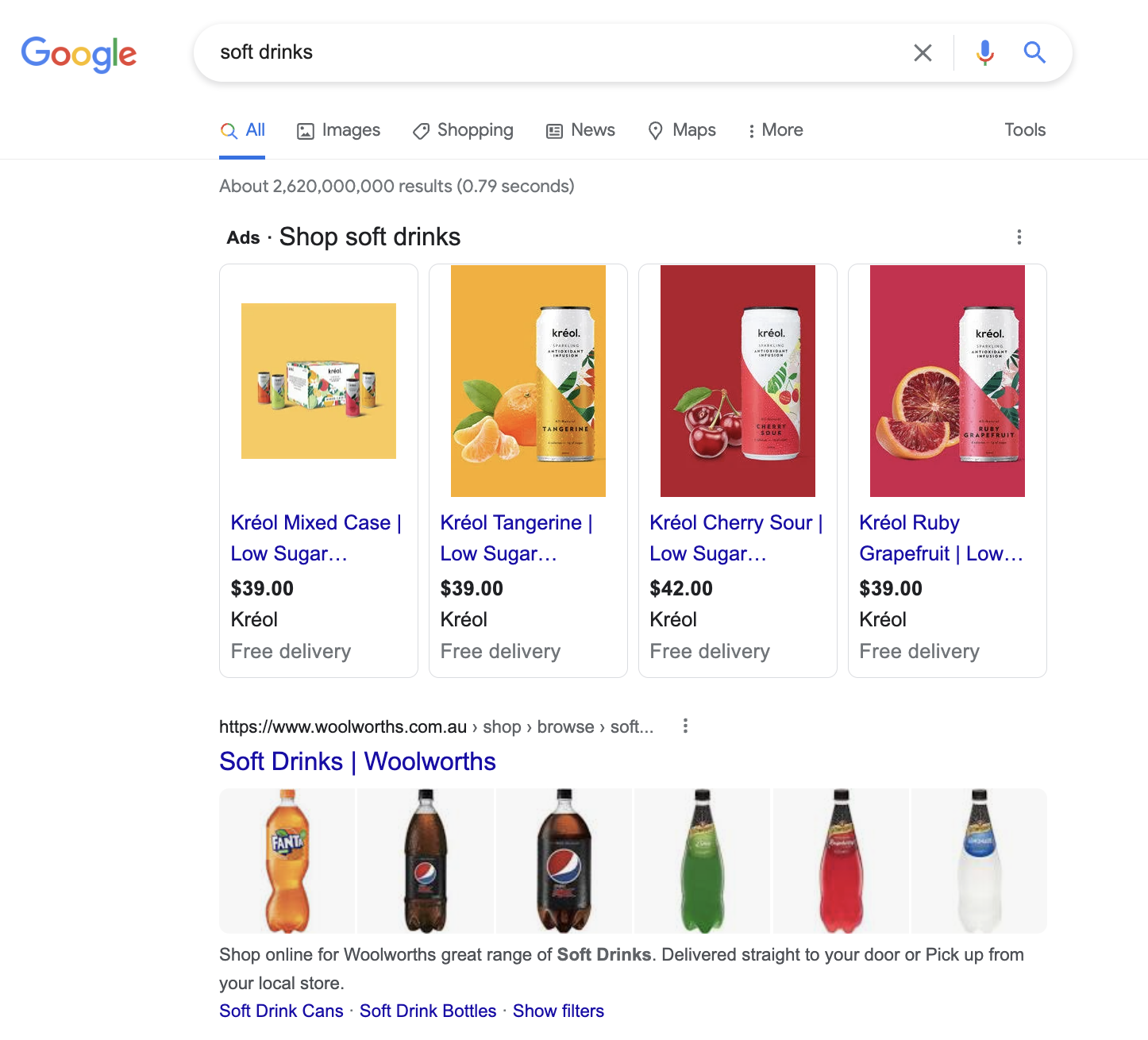
SEO seems the most common marketing jargon that gets thrown around by marketing-experts and novices alike. But what really is it? Or more important what can it do for YOUR business.
There is so much moving parts in a business, particularly a small business. Let’s be honest, if Bob hasn’t paid the invoice and your supplier has some shipping issues, SEO marketing is the last of your worries.
It is already intimidating for small business owners to navigate marketing. Here’s the basics so you know the ABCs of SEOs.
What is SEO?
It stands for Search Engine Optimisation. To break it down even more ‘Search Engine’ essentially refers to Google (or any other search engine you use) and the ‘Optimisation’ really refers to the ranking in which your website appears on Google.
For example, if you were to search ‘soft drink’, Woolworths is one of the first results that show up = Good SEO. But if, I go on the 5th page of search results I see The Reject Shop = Not great SEO. There are some caveats such as local SEO, authority sites etc. But on a surface level that is essentially what SEO refers to.

Below are some of the basic and essential things you need to know to improve your SEO:
1. Do keyword research and use it on your website
Setting up your website and managing it already feels like a passion project. It’s a hub to showcase your products and services, this is your first step.
Now it’s time for keyword research. Try to think of it as hashtags but higher-level. Hashtags allow people browsing filter for specific information and content. It is a bridging point to help your business be found by the right people.
When doing keyword research, ideally you will need to do one for each page. It is imperative you truly understand how potential customers are searching for businesses like yours. Knowing the phrases and keywords they are searching for while looking for your product or service, you can then integrate this into your site.
There are 2 main ways you can do this: 1) brainstorming the words yourself or 2) using an online analytics tool to help you decide which keywords to focus on.
Using the keywords in your URL is most important, and should also feature in the page title, meta title, and sprinkled throughout your web’s content every 100-150 words.
2. Know where your customers look for content
Cater your SEO for your market. Though it seems more beneficial to cast a big net in the ocean and hope for the best, it would be better for the fisherman to check the weather, use the right bait and go at the right time to catch 20 red snappers instead of getting a lot of blowfishes and seaweed with maybe 1 or 2 snappers.
Depending on what kind of business you have will determine your approach. For example, if you’re a brick-and-mortar store that sells mountain bikes and bike accessories, the majority of your customers are probably not checking TikTok or Instagram accounts to decide to buy from you or not.
They’re probably looking at your Google reviews, online forums or blog from a local online bike enthusiast. Then local SEO should be the priority. If you’re an e-commerce website, then think a little bigger.
When you know what content resonates with your customers – whether it’s a TikTok video or a long-form review on someone’s blog – you win customers by creating content that establishes you as an expert in regard to your products and services.
Content is one of Google’s top three ranking factors and time has shown again and again that customers are hungry for information. Show your customers just why they should choose you.
3. Remember Google ranks the pages, not websites
So what does that mean? Google focuses more on the individual pages of your websites than your overall website. Again, if you’re short for time, the best bang for your buck is optimising individual pages with great detail versus broadly doing it across your website.
Yes, it is tedious. And yes it is an ongoing process. And yes, you CAN pay an SEO expert or an agency to do paid traffic with Google AdWords, Facebook ads, etc., but once you stop paying, the traffic stops (and you’re probably short of hundreds, sometimes thousands of dollars. Money that could be well spent somewhere else).
A little help never hurt anybody, traffic is indeed part of Google’s algorithm to help rank your website, but know that good help is hard to find and most of the help is pretty pricey.
Much like a gym membership, SEO is a long-term investment strategy for you and your business. The truth is very few small business owners do it (or care), but small fixes and minimal time effort can still contribute to a positive impact. Much like going to the gym, you might hop on a bike for 10 minutes at a 3 resistance, but you’re still doing much better than the guy whose on his couch eating Maccas. With time and consistency, you might not even realise until a year later your pants are a little lose and your jaws looking a little bit sharper.
Like the old saying goes, good things come to those who wait. It can take several months to see the fruits of your labor, but the end results will speak for themselves.
About the Author:
Amy Miocevich is an Australian author of Very Good Marketing, director of her company Lumos Marketing and a mum. Amy has a plethora of business knowledge and experience helping individuals across all industries over her professional career. She has a deep and innate passion to help small businesses achieve their Big Hairy Audacious Goals, whatever they may be. When Amy isn’t busy working or waking up at 5 am to run, she is probably eating ramen or wanting to eat ramen. Say hi to Amy at amy@lumosmarketing.com.au.










